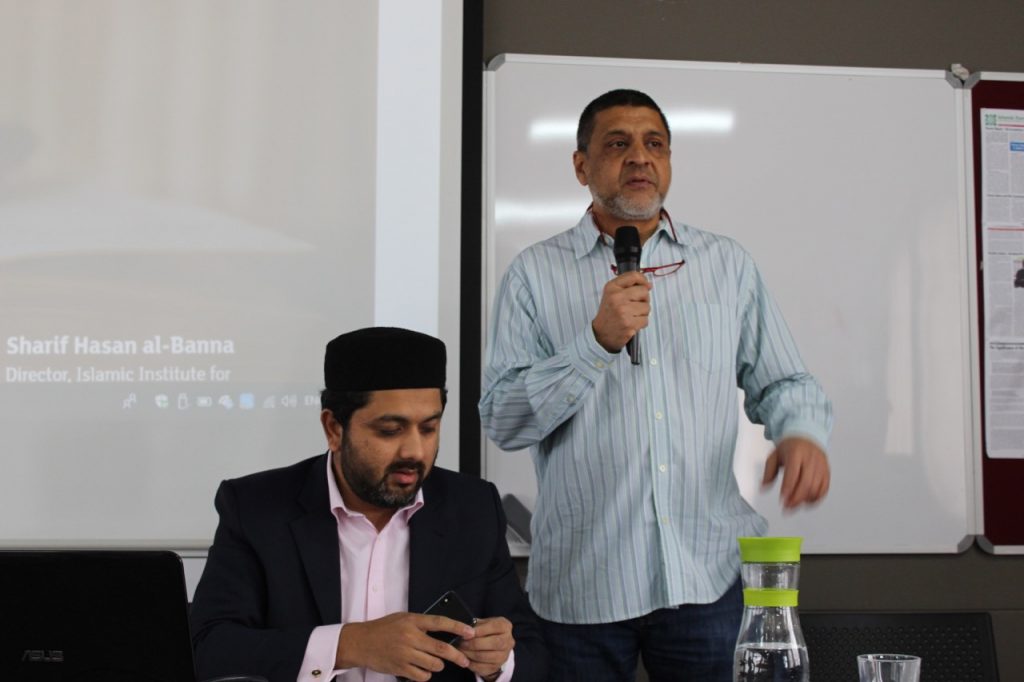The Islamic Forum hosted Shaykh Sharif Hasan Al-Banna at the SulemanLockhat Auditorium, Mariam Bee Islamic Centre on Sunday 21 October 2018 where he discussed the concept of Halal but un-Islamic.
It was an interesting topic and one that is not generally discussed as the focus is more in getting fatwas instead of dealing with our realities. He went on to say “how can the halal be un-Islamic? It can be and it is. This is when fiqh is divorced from its ethical setting. It is when the legal value of an action is the only concern, sometimes at the expenses of other considerations. In pursuit of halal, we forget that the Shariah, often thought of as a body of law, is foremost an encompassing ethos derived over time from the primary sources – of which legal norms (fiqh) derived in pluralist fashion (ikhtilaf) are only a part. We forget to recognize that Islam did not originate in a legal tradition nor are ultimate truths reached through legislation.”
He enquired whether the notion of “tahsin” (determining an act to be good and sound) and “taqbih” (determining an act to be evil) is determined by intellect (aql) or does it require revelation (wahy/naql). Three schools of thought addressed this notion and they were the “Mutazilites”, “Asharites” and the “Maturidites”.
The Mutazilites believed that good and evil is determined by intellect and that rationality was seen as the key to revelation and that there could be no contradiction between reason and the Texts..
The Asharites believed that good and evil is determined by God and through revelation and that it is revelation which shapes Islamic ethics and that God inspires human beings in their quest for good, then, by His exclusive will, establishes what constitutes good and evil.
The Muturidites on the other hand believe that good and evil can be determined by the intellect but revelation is required to provide moral obligation and determine consequences. their stand is halfway between rationalism and revelation.
He went on to discuss in the principles of halal and haram and what is Islamic? “Islamic is that thought or action which meets the ethical ideals of Islam, not just legal compliance.”
So “what is Islamic” about any thought or action? Is it limited to scriptural legal validation or can it be determined by an ethical vision alignment? People generally fall into two camps – one which wants to Islamise everything and the other which harbours an inferiority complex in using the word ‘Islamic’ or sees a limited role for faith in the public space.
“I would contend that the term ‘Islamic’ has both legal and ethical dimensions. If it is permissible in law, then it is ‘halal’ or ‘mubah’ and if it is validated by the ethical standards of Islam, only then does it become ‘Islamic’. Legislation and ethics are two sides of the same coin and should depend on each other as an integrated whole. Traditionally, this distinction did not exist and thus the master jurist Imam Abu Hanifa defined fiqh itself as ‘knowledge of the responsibilities and liabilities of one’s self.’ This definition encompasses both the legal and ethical facets.” His talk led to many questions and it was felt that this topic needs to be dealt with in more depth at a future stage.
Shaykh Sharif Hasan Al-Banna is a scholar, author and entrepreneur. He is the Founding Director of the Islamic Institute for Development & Research (IIDR) in the UK and an Advisory Board Member of the Research Center for Islamic Legislation and Ethics, a think tanked based at Hamad Bin Khalifa University, Qatar Foundation. He is also a Board Member of Maqasid Institute (USA) and teaches courses on Islamic Law and Ethics at Oxford University.

